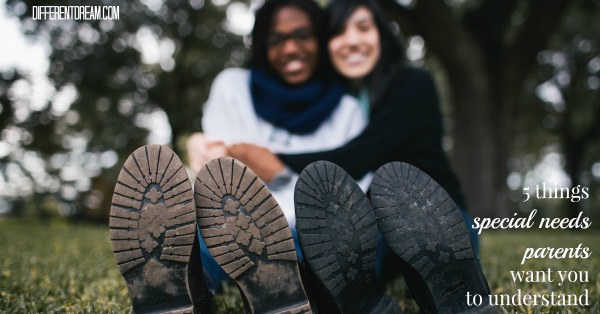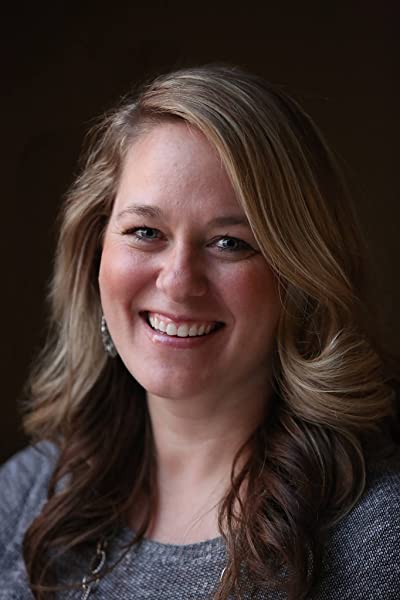5 Things Special Needs Parents Want from Friends

Special needs parents want so many things for their children with disabilities. They’re so busy meeting their kids needs, they fail to pay attention to their own. Today, guest blogger Kimberly Drew writes about 5 things special needs parents want from their friends. See if they resonate with you.
5 Things Special Needs Parents Want from Friends
Last night I went to a meeting for a disability ministry our church will be launching soon. The meeting itself was productive, but it was the friendship around the table that really spoke to my heart.
You see, I received a large packet in the mail from the high school my daughter will be attending. It suggested that my daughter sign up for English, math, science, and social studies classes next year. Another insert provided check off options for cheer leading or other spring sports.
For many parents with children with special needs, milestone moments for their peer groups can be difficult. When I read the packet, I started to cry and threw it on the table. At first I was frustrated that we even received it. But the mass mailing was not meant to be an insult–it was just a mailing. A school district that serves hundreds of students might not realize how sad it is for parents to send their disabled children to a multiply disabled classroom.
There are very few people who understand how isolating and disappointing these moments are. The women sitting around the table at the church meeting let me cry. I didn’t have to fill in any blanks for them to understand what I was feeling. There was a strong sense of community for me that was very healing.
The experience made me think about my own circle of friends, family, and church family, my local school family and why it’s so difficult to talk about these things and process them with people close to me. Here are a few reasons that I came up with about what special needs parents want from their friends and family. It’s not an exhaustive list, but I hope it will show your own circle of influence how to love and support to you.
- I don’t want you to think that I’m having a pity party. I don’t like to complain about the challenges of raising our daughter because I don’t want to be a Debbie Downer or a negative person. Everyone has things that they struggle with emotionally, and this just happens to be our thing. Sometimes, I hesitate to share this with you because I don’t want you to think that I am just feeling sorry for myself.
- I don’t want you to pity me either. If I put my feelings into words, it sounds so very sad. I don’t want you to feel sorry for me. What I really want is for you to hear me, hug me, and love me through it.
- I don’t want a pep-talk. Sometimes I just need to get the feelings out to get it over with. I don’t need a commentary about looking for the bright side or a pep-talk about what we have going for us. Our circumstances stink! We can’t change them, and I can’t change that it hurts me. No one gets through grief with a pep-talk, so let the situation be what it is. Let it take its course. If I stop brushing my teeth and getting out of bed, then you can give me a pep-talk. Otherwise, just be there for me.
- I’m afraid you’ll back away. I’ve talked to hundreds of parents of kids with special needs. They all say that that when things get hard, some people back away. They can’t take the drama of your life. They stop calling, stop messaging, stop asking. I wish I could change what we are going through so when those people ask how things are going, I don’t have to give medical run-downs or list of upcoming appointments. I can’t change the fact that my life revolves around my child’s disabilities. This is my life…but sometimes I shield it from you because I don’t want to have one more friend who packs up and heads out.
- It’s just easier not to talk about it. Sometimes my coping mechanism is avoidance. So it means a lot when a friend initiates the conversation. We need friends who are proactive about asking how we are dealing with things. I appreciate friends who anticipate situations that might be hard for me and ask about them. I cry, and they listen. It’s so therapeutic. It won’t dominate our friendship, but it’s a part of who I am. Love me enough to not let me ignore the pain.
What Else Do Special Needs Parents Want from Friends?
Did Kimberly’s list include what you want? If not, add to the list of what special needs parents want from friends by leaving a comment in the comment box.
Do you like what you see at DifferentDream.com? You can receive more great content by subscribing to the quarterly Different Dream newsletter and signing up for the daily RSS feed delivered to your email inbox. You can sign up for the first in the pop up box and the second at the bottom of this page.

By Kimberly Drew
Kimberly grew up and went to college in the small town of Upland, IN. She graduated from Taylor University with a degree in Elementary Education in 2002. While at TU, she married her college sweetheart and so began their adventure! Ryan and Kimberly have four amazing kids on earth (Abigail, Jayden, Ellie, and Cooper), and a baby boy waiting for them in heaven. Their daughter Abigail (Abbey) has multiple disabilities including cerebral palsy, a seizure disorder, hearing loss, microcephaly, and oral dysphagia. She is the inspiration behind Kimberly’s desire to write. In addition to being a stay at home mom, Kimberly has been serving alongside her husband in full time youth ministry for almost fourteen years. She enjoys working with the senior high girls, scrapbooking, reading, and music. You can visit Kimberly at her website, Promises and Perspective.
6 Comments
Submit a Comment
Subscribe for Updates from Jolene
Related Posts
The Lessons I Learned while Raising a Child with EA/TEF
Jolene Philo reflects on a lifetime of lessons learned while raising a child with EA/TEF and shares the insights she’s won.
Looking Back at Your Child’s EA/TEF Journey
Looking back at your child’s EA/TEF journey can give parents a new perspective about past events. Guest blogger Maggi Gale shares how her look back clearly showed her how God was with their family during their daughter’s very unusual first weeks of life in 2002. Three...
How Do I Let Go of My Adult EA/TEF Child?
Valeria Conshafter explores the question “How do I let go of my adult EA/TEF child?” for EA/TEF Awareness Month.






I don’t know how Special Needs Parents do it all. I think they’re Superheroes and Saints for what they do for their Special Needs Children everyday. I couldn’t and wouldn’t do it at all, I wouldn’t want the heartache of the grief, worry, and frustration of it all. Isolation is heartbreaking all in itself, but no one wants a One-Way friendship either…
I’m always blessed by your honesty, Kimberly. Thanks for teaching us what your life is like, and other parents with special needs kids, so we can understand a tiny bit better. So thankful God is giving you people who support and listen (since I can’t be there, ha!)
Number four was the most truthful one for me.
I would like to add to the list: Ask me about me, invite me out, I may give you a rain check more than two times but don’t stop asking.
I don’t want someone who when I vent tells me how I shouldn’t feel that way. I shouldn’t think that way. I can’t help the way I feel. The way I think.
I love my son. I hate his disability. I hate that life for my family has to be different than what I dreamt it would be. That his brother and he aren’t close. That he lashes out because he is angry that he can’t do the same things out because his brother is taking the attention away from him. That he is unable to speak do he can’t easily be a part of our conversation.
It’s all very frustrating. The constant bickering. The unfulfilled dreams. If I need to vent, I want someone to listen and not judge me or make me feel like I’m a bad patent. I don’t want someone telling me I shouldn’t think our feel the way I do.
Special needs parents want to be invited to social events, even if it’s difficult to attend them. A dinner out once in a while or a group party with friends or a game night with our families help make us feel part of a community, and gives us a bit of “normalcy”.
Thank you so much for being such a fabulous ambassador to the body of Christ for families.living with disabilities .